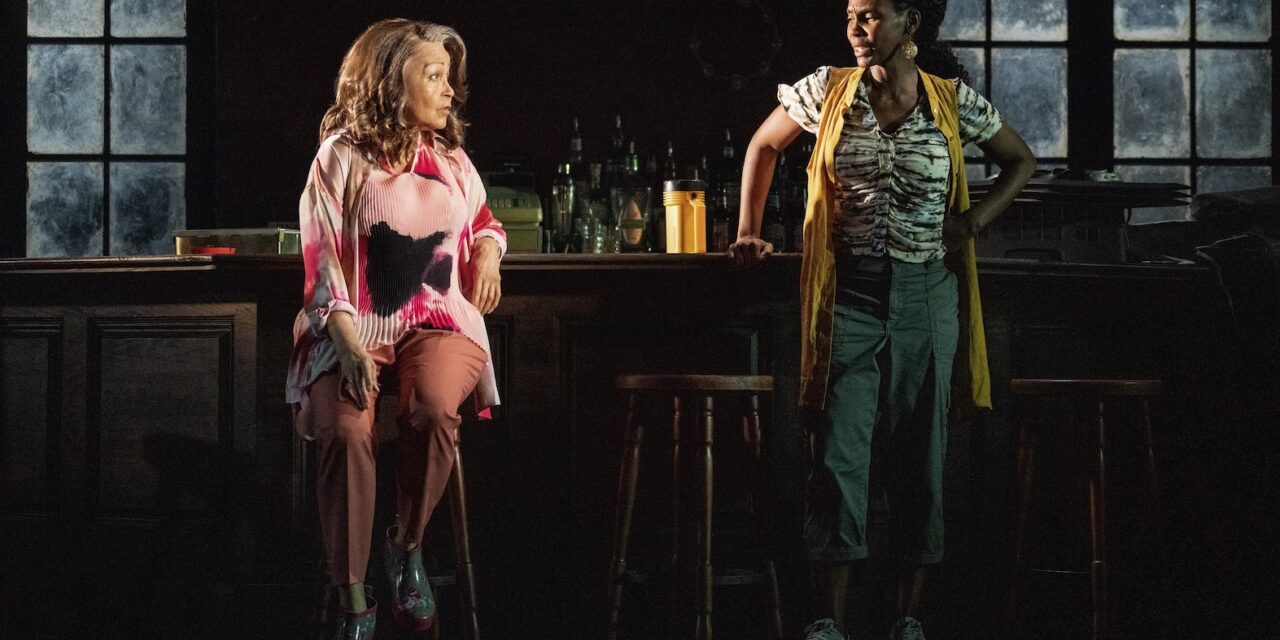By Samuel L. Leiter . . .
Although I live in New York, Hurricane Katrina, which hit New Orleans and the Gulf Coast in 2005, had a devastating effect on my family, even more than our own Hurricane Sandy, seven years later, which missed my block in South Queens by only a few hundred feet. We’ll never forget the frantic calls during Katrina—when service was available—from our relatives hunkered down in Pass Christian, MS, a block from the Gulf itself, and the heroic, six-hour drive of a cousin on Florida’s West Coast to bring them gas so they could drive back to safety in the Sunshine State. Erika Dickerson-Despenza’s play, shadow/land, at the Public Theater’s LuEsther Hall, relives Katrina as experienced by a New Orleans mother and daughter; but, the play itself must be downgraded from hurricane status to thunderstorm—it’s got some power, but there’s no need to bring in the copters.
shadow/land is the opening work in the playwright’s planned 10-play cycle about the effects of Katrina on the populace affected by it. The mention of the name Despenza in the dialogue implies an autobiographical element. Ms. Dickerson-Despenza (cullud wattah) says in her script, “the ten works underscore (neo)colonialism, environmental racism & the erasure of Black land legacies through the distress of disaster, evacuation, displacement & urban renewal.” It’s good that she informs us of these concerns because, fortunately, shadow/land itself is anything but an overt sociological tract.
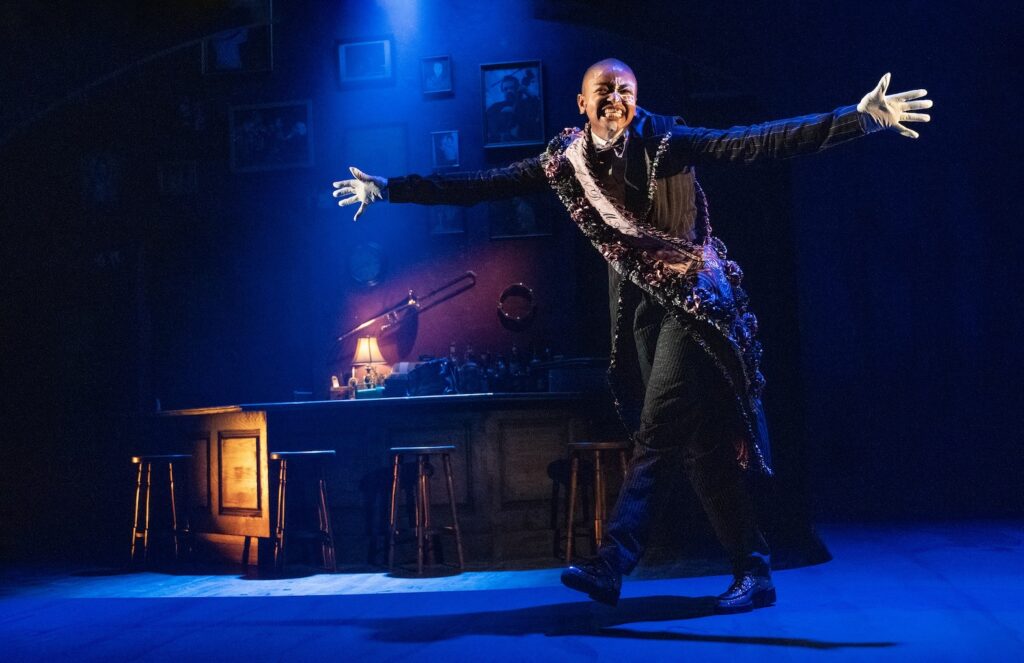
The Public first produced the piece in 2021 as a podcast (its 70 minutes is now expanded to 90), which received warm reviews, with the NY Times noting that the well-performed play “may be better in your headphones than it would have been onstage.” But now it is onstage, and the results confirm that observation. The play’s title comes from the name of a “jook joint”—a saloon where entertainment and dancing are enjoyed mainly by nonwhite patrons—whose primary owner is 80-year-old, Afro-Creole Magalee (Lizan Mitchell, Ohio State Murders, of the original podcast, sensational), suffering from middle-stage dementia.
She shares the property, called Shadowland—located in New Orleans’s Central City, which has been in the family’s possession for many years—with her middle-aged, caretaker daughter, Ruth (Joniece Abbott-Pratt, The Good Negro, excellent), queer but in a straight marriage. Mother and daughter, both speaking a poetic, if not always graspable, patois, differ about the latter’s desire to sell the place, constantly vandalized by local hoodlums in the deteriorating neighborhood, to a developer who promises “urban revitalization.” But Magalee, despite the family’s need for economic relief, is too invested in the family heritage to divest.
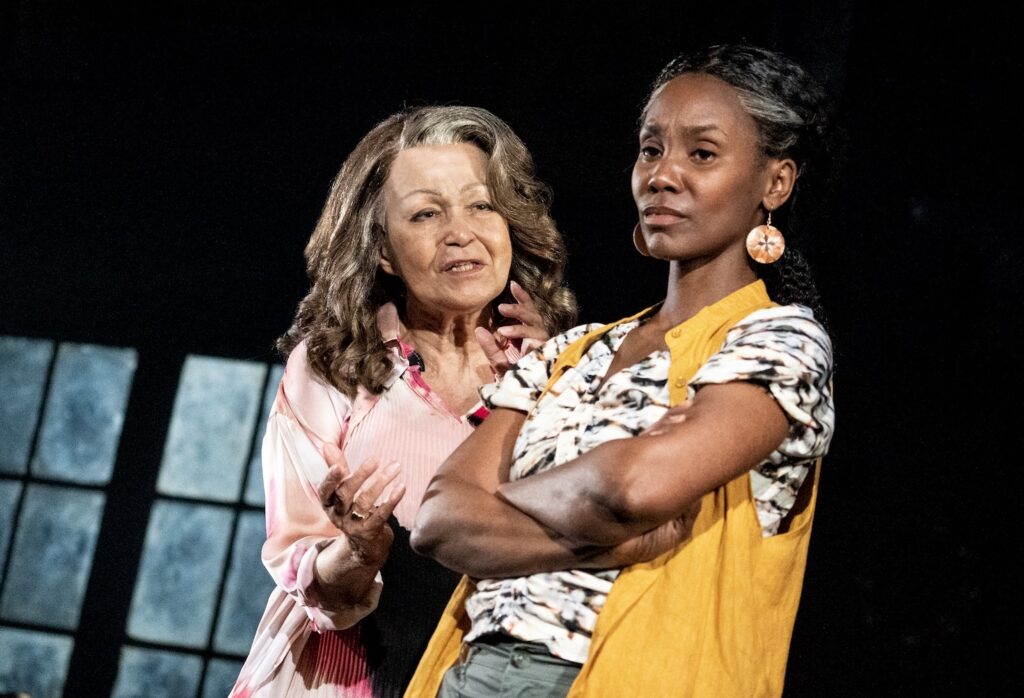

Although the narrative is clear enough, the playwright juices up its theatricality by introducing a traditional storyteller (Christine Shepard) suggestive of Haitian Vodou traditions; now and then given to comical playfulness, she has one side of her face painted with a white, tribal mask-like design. Much of the time, she wears a costume (designed by Azalea Fairley) suggesting a Mardi Gras version of a funeral suit, marshal’s sash, tails, and all; she is, in fact, called the Grand Marshal in the program. During her frequent intercessions in the action, she dons other, equally theatricalized clothing, as well, not to mention a striking floral headdress.
What she says is often so densely poetic or dialect-inflected that it’s incomprehensible. She begins, for example, thusly (as per the writer’s preference for lowercase):
you protest the wet, clinging heat knowing / you come here to be touched, to delight in violent gusts of weak chicory / & confederate jasmine, spilled whiskey / & sunburned piss.
The slender, graceful Ms. Shepard speaks while engaging in expressive dance movements, created by Jill M. Vallery. Early on she came to my aisle seat and asked, in mime, if my companion was my lover (she was not), but nevertheless withdrew a sheet of condoms, tore one off, and handed it to me. It drew the biggest laugh of the performance.
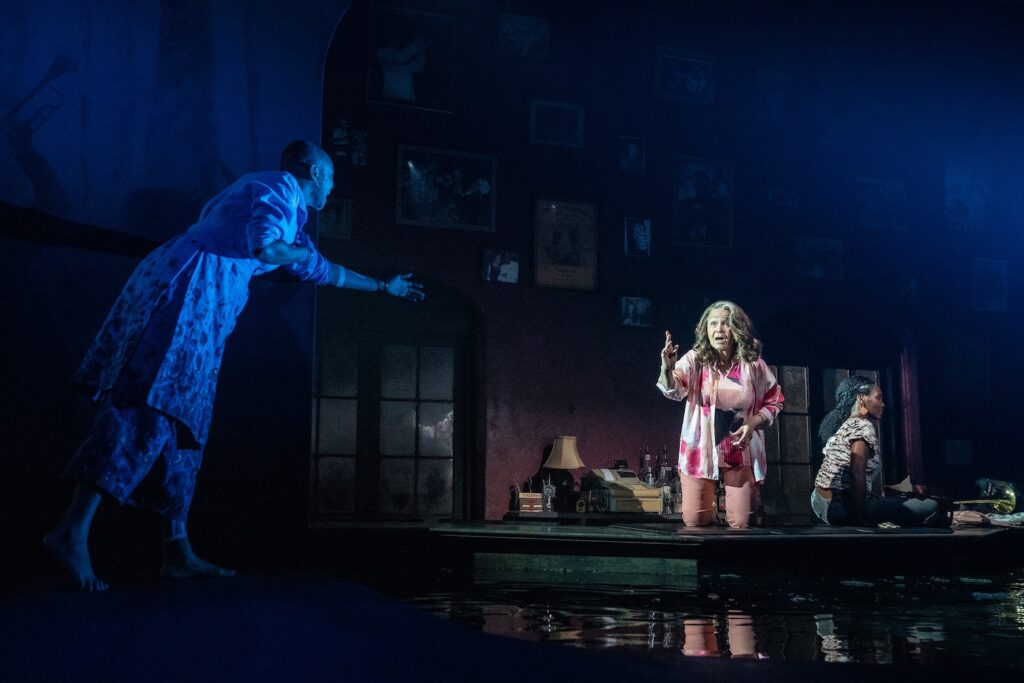

Ruth urgently wants Magalee, who can’t bring herself to leave for shelter at the Superdome, to sign the papers, and, with the place threatened by the imminent hurricane, head for a safer place. People throughout the city, especially the more prosperous whites, are evacuating, and the danger of staying intensifies as the wind blows the panels protecting the windows behind the bar away, a clock crashes to the floor, and water pours in from a hole in the unseen roof.
Ruth and her mother bicker over personal matters—like Magalee’s nagging about Ruth’s lesbian affair while in a solid marriage; the decline from Shadowland’s good old days; Ruth’s need to find happiness; generational differences; and, most charmingly, Magalee’s failure to capitalize on her singing talent, a taste of which we get to enjoy. Not much else transpires—other than the women’s increasing desperation—over the four days before the possibility of rescue appears. It may not be too late for Ruth’s cell phone, which seems to have a forever battery, but it is for one of the characters, whose passing is celebrated with the Grand Marshal on another plane.
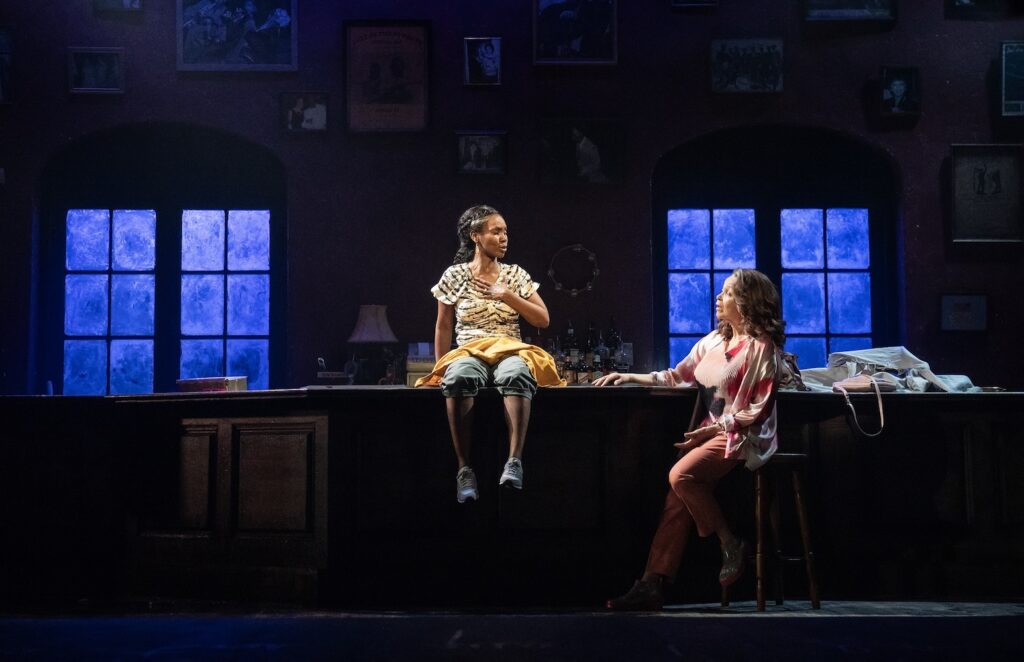

Jason Ardizzone-West’s set is designed so that the foreground is surrounded by a slightly raised barrier, creating a downstage pool as the waters rush in; meanwhile, the bar, running from one side to the other, sinks, the water lapping at its edge, providing a narrow space to which the actors are confined for a good deal of time. It’s not clear, however, whether the space is meant to represent the bar’s top or the roof outside, half of which is said to be gone; the rear wall remains visible, even as the characters frantically try to catch the attention of aircraft flying overhead. Given all the other technical efforts involved (not to mention evocative music by Delfeayo Marsalis, and a distinctive sound design by Palmer Heffernan), one wonders why the wall couldn’t have been deconstructed to make the situation more visibly understandable.
shadow/land simmers in its linguistic gumbo, glows in its moments of magical realism, and sizzles in its personalized recreation of an historical catastrophe still fresh in our memories. Its domestic drama is not particularly resonant, nor do we depart with especially sharpened perceptions of its sociopolitical concerns. It introduces some decent technical effects but also leaves us in the dark regarding what we’re seeing. I did not hear its widely appreciated podcast, but perhaps this is a case where using your imagination is better than having something literally right before you.
shadow/land. Through May 21 at Public Theater’s LuEsther Hall (425 Lafayette Street at Astor Place). www.publictheater.org
Photos: Joan Marcus


